Can Protein Shakes Cause Diarrhea? 6 reasons and solutions!
Author:
Unlock your full potential by engaging with our experts and community! Have questions about your fitness journey or looking for expert advice on weightlifting techniques? Don’t hesitate — leave a comment below and Oleksandr Maksymenko will provide a personalized answer and insights to help you reach your goals.
Torokhtiy is reader-supported. Some links are affiliate links, and we may earn a commission at no extra cost to you. See our disclosure page for details.
This is more than an article, it’s a guide in which I will be talking about a very relevant topic as many of us drink protein shakes. To do so we will be answering the question: can protein shakes cause diarrhea?
Can protein shakes cause diarrhea? – Unfortunately, this really happens due to an allergy or intolerance to milk proteins, lactose intolerance, as well as sensitivity to food additives contained in protein powders. Taking protein shakes immediately after training can also be the reason why people may have protein shake diarrhea.
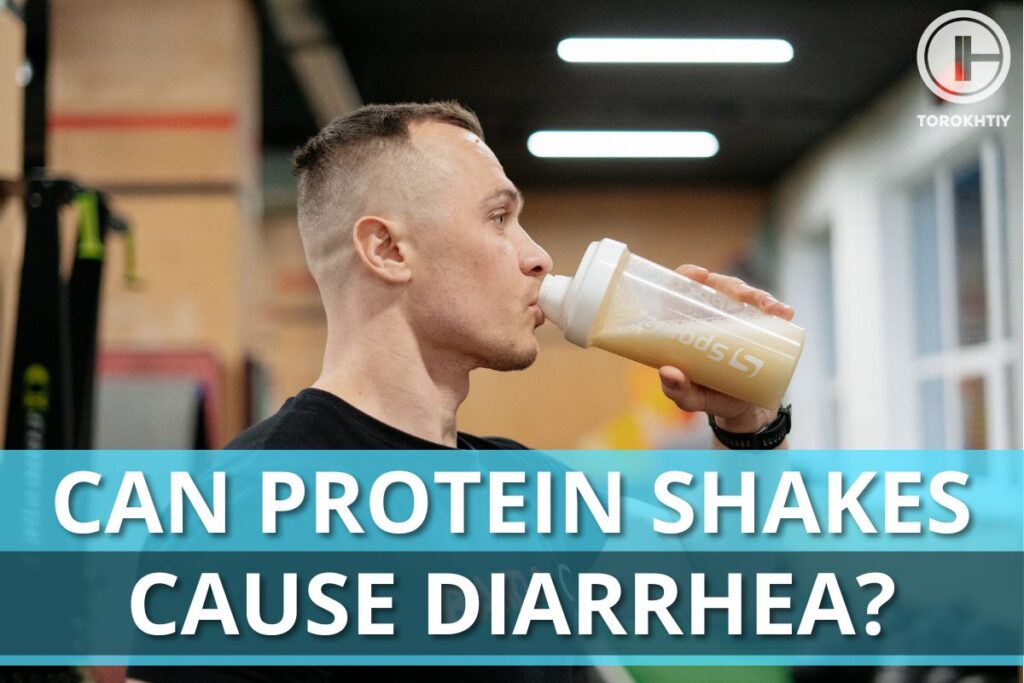
6 Reasons Protein Shakes Can Cause Diarrhea:
1. You Have Allergy to Milk Protein
An allergy to milk proteins is an immune reaction to the proteins found in milk. Symptoms after dairy-based protein shake may include immediate coughing, itchy skin rash (hives), itching and tingling around the mouth, swelling of the throat, tongue and lips, and vomiting.
Over time, additional symptoms may appear, including runny nose, watery eyes, abdominal cramps and diarrhea with blood. In the most serious cases, a life-threatening reaction called anaphylaxis may occur.
Symptoms can occur quickly after consuming milk proteins and include narrowing of the airways and breathing problems, facial flushing, itching and sudden drop in blood pressure. Anaphylaxis is a medical emergency situation.
Allergy happens to both whey protein and casein. If you have an allergy to milk proteins, most likely you have known about it for a long time, so you do not use milk-based protein supplements.
2. You Have a Lactose Intolerance
Unlike an allergy to milk proteins, lactose intolerance is not a life-threatening condition, because lactose (milk sugar) does not cause an immune reaction. However, it may create great discomfort for people with lactose intolerance.
In case of lactose intolerance, the small intestine produces low levels of lactase – an enzyme that breaks down lactose. Due to this, lactose is not absorbed by the small intestine, but enters the large intestine. Bacteria interact with undigested lactose, which causes symptoms including:
- Overall digestive discomfort and bloating,
- Rumbling sounds in stomach,
- Pain in abdomen,
- Nausea, vomiting,
- Diarrhea.
Lactose is found in dairy products, including dairy-based protein supplements, especially whey protein, which may contain anywhere from zero to a significant amount of lactose.
It means that your whey protein can cause diarrhea, especially if it is a whey protein concentrate. On the other hand, whey protein isolate contains zero or much less lactose than concentrate.
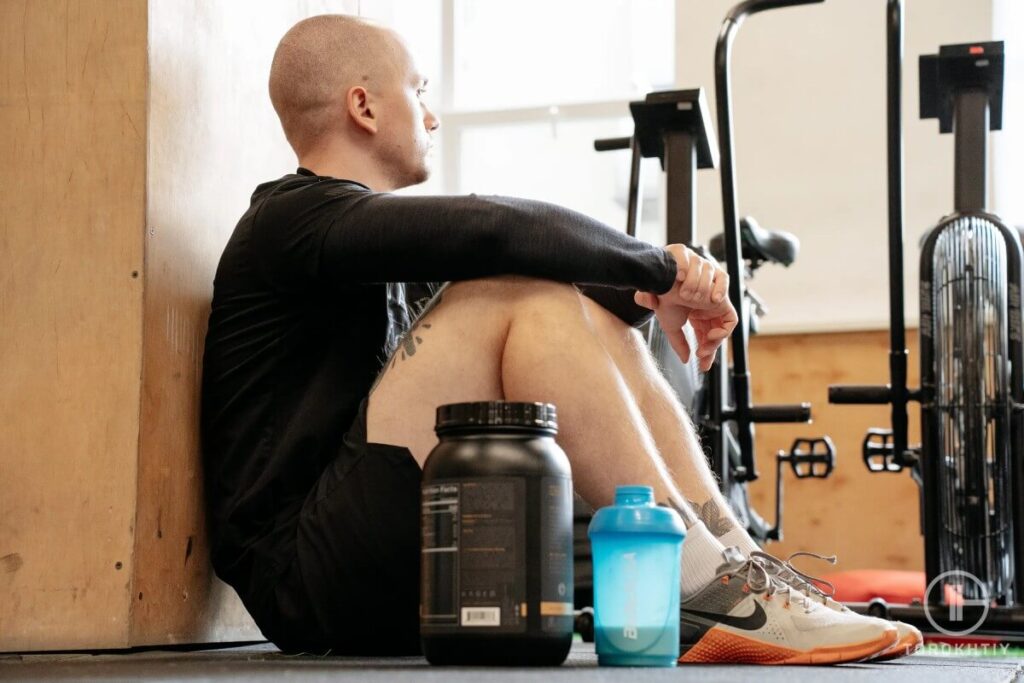
3. You Have Milk Protein Intolerance
Even if you don’t have a problem with lactose, you may still have a problem with digesting the milk protein itself. The symptoms of milk protein intolerance are the same as those of lactose intolerance.
4. Some Sugar Alcohols and Sweeteners Are to Blame
Usually, sweeteners of natural or artificial origin are added to protein supplements. Otherwise, the taste will not be so attractive. And these sweeteners can also cause digestive problems. It is interesting that the main culprits of digestive issues are sweeteners of natural origin.
Specifically, these are sugar alcohols, stevia and Monk Fruit, which may cause bloating, gas and even diarrhea! Pay special attention to the sugar alcohols mannitol and sorbitol, which most often cause problems.
So, even if you use a vegan protein that does not contain milk proteins or lactose, if your protein supplement contains sugar alcohols, stevia, or Monk fruit, you may still experience diarrhea.
5. You Have Sensitivity to Some Food Additives
You may also look for food additives in the form of thickeners, emulsifiers, flavor enhancers, bulking agents and others. Many protein supplements contain one or more of these food additives, that improve texture, mixability and flavor, and increase the volume of product.
Although food additives are generally safe and contained in amounts well below the maximum safe level, some people have sensitivities to particular additives, which can cause gastrointestinal symptoms, including diarrhea. And we may not even know that we are sensitive to some food additives.

6. You Drink Protein Shake Too Soon After Exercise
Drinking your protein too soon after exercise can also lead to diarrhea from protein shake. Why does it happen? Physical activity may cause “exercise-induced gastrointestinal syndrome”.
Scientists identify several possible causes, including the redistribution of blood from the digestive organs to the working muscles, impaired nutrient absorption and altered gastric and intestinal motility. However, the main cause of unpleasant symptoms, including diarrhea, is a reduction in intestinal blood flow, or gut ischemia.
Although this syndrome primarily affects long-distance runners and other endurance athletes, any physical exertion, including resistance training, causes blood redistribution to the working muscles, which can negatively affect the functions of the gastrointestinal tract during and immediately after exercise.
Given that you may already have problems with lactose, milk protein or sensitivity to food additives, consuming protein shake immediately after a workout only increases the likelihood of diarrhea.
7 Tips for Choosing a Protein That Doesn’t Cause Diarrhea
Now that we have understood the reasons why the protein shake can cause diarrhea, we can look into some tips to avoid it.
1. Switch Protein Brand or Product of the Same Brand
You may experiment with the same protein from different brands. For example, if you currently use brand A whey protein concentrate, try brand B whey protein concentrate. You can also change the type of protein supplement from the same brand.
For example, instead of whey protein concentrate, choose a protein that contains a blend of milk protein (which contains a mixture of whey protein and casein) with whey protein.
2. Switch Whey Protein Concentrate to Whey Protein Isolate
Because of the additional filtration steps, the whey isolate contains zero or significantly less lactose than the concentrate. Therefore, if the problem is only in lactose intolerance, this small change may be enough to eliminate protein shake diarrhea.
When buying a new product, always choose the smallest package to evaluate the gastrointestinal tolerability. If there is no discomfort after a few servings, this means that this particular product is suitable for you and you can buy a larger package later.
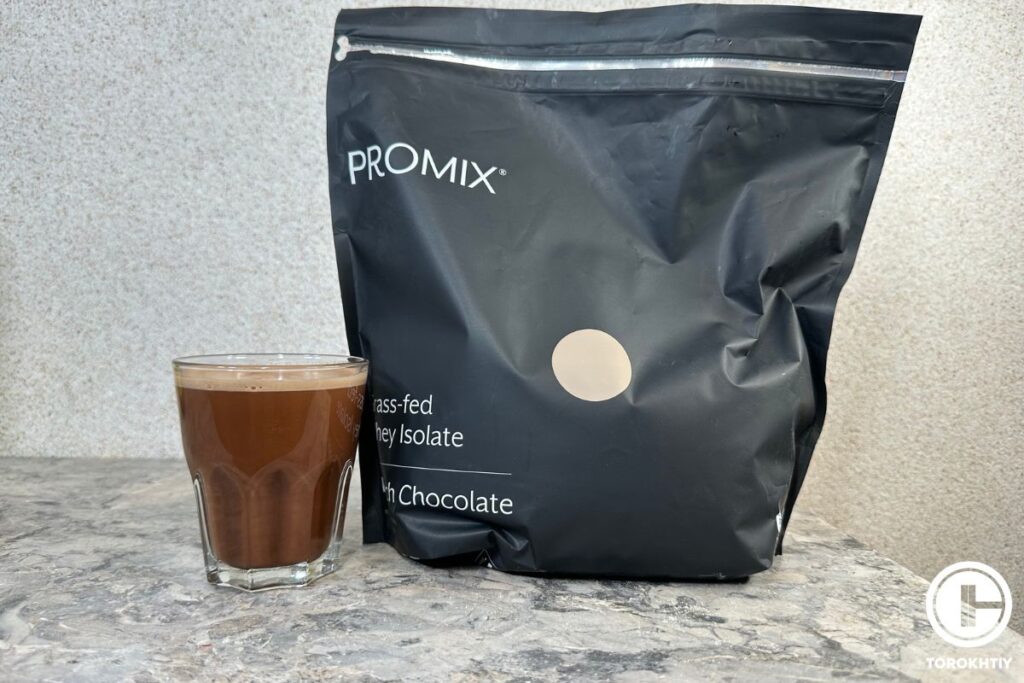
3. Replace Your Protein Source
Try non-milk protein. The selection of various products is large – from egg protein to vegan options – pea, soy, rice, hemp, or a blend of several of them.
You can also try protein blends, which have several different sources of animal based protein, for example, egg and whey. In this case, the percentage of milk protein and lactose will be lower, which can reduce the likelihood of diarrhea.
4. Mix Your Protein Powder With Water
By mixing protein powder with water, you eliminate any other possible sources of problems. For example, mixing whey isolate with lactose-free milk may eliminate the lactose problem, but it still contains milk proteins that can cause symptoms on their own.
By mixing protein with juice, we get a lot of fructose, which can also cause diarrhea. Therefore, to exclude all other potential sources of the problem, the best option is to mix protein powder with water.
5. Wait a Little After Exercising
You can wait at least 30 minutes to 1 hour after exercising to get your protein shake. This way you give your body time to redistribute blood flow to your digestive system.
Another option is to eat a high protein whole meal after your workout (like turkey with brown rice), and drink a protein shake later to separate it from your workout.
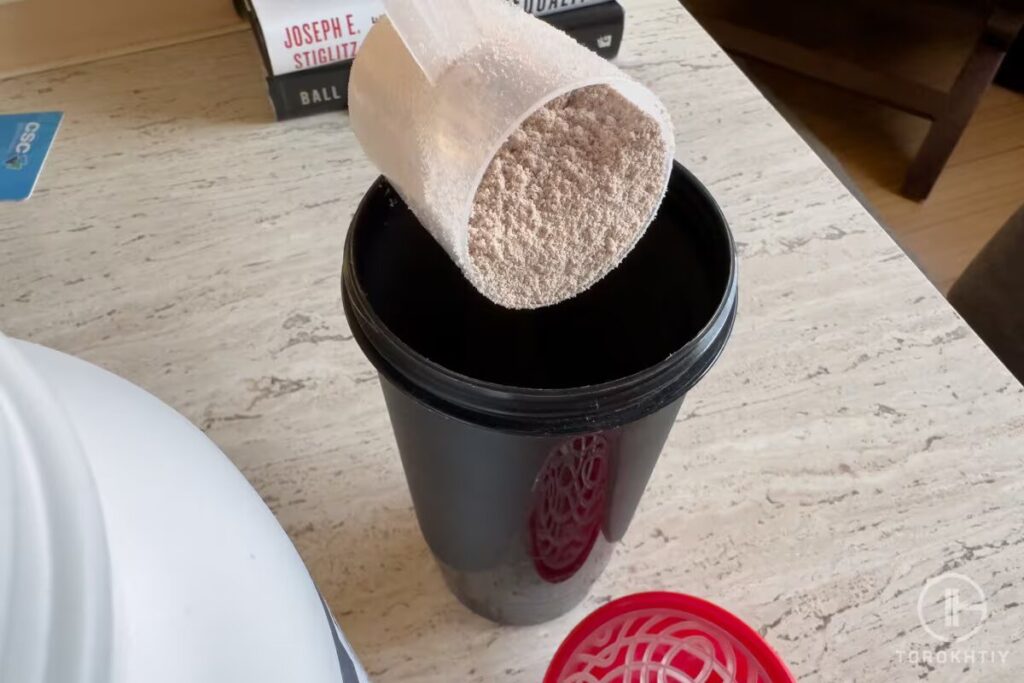
6. Check Ingredients List
When you buy a protein supplement, always read the ingredient list for the presence of sugar alcohols (they end in “-ol”: sorbitol, mannitol, etc.), stevia and Monk Fruit. Keep in mind that the closer it is to the end of the ingredients list, the less it is, which may be much better for your gut.
If the product contains erythritol, it should not cause concern, as this sugar alcohol usually does not cause problems for our gastrointestinal tract.
You should also read the ingredient list to choose the protein source with less additives. The fewer additional ingredients other than the protein source itself, the less likely you are to come across an ingredient you have a sensitivity to.
7. Make Adjustments to Your Overall Diet
Here are several recommendations to help reduce your chances of getting diarrhea from protein shake:
- Limit yourself to no more than one serving of protein shake per day,
- Use a smaller portion than indicated on the package,
- Instead of consuming a protein supplement in a liquid form (shake) add protein powder to solid food, such as oatmeal.
If none of the recommendations help, you will have to give up protein supplements. In this case, the best option is to increase the portion of protein products in one or more meals.
Protein We Recommend
Promix Whey Protein Isolate
- Main Purpose: Build Muscle, Recovery
- Suitable for Vegans: No
- Protein Source: Whey Protein Isolate
- Serving Size:
- 34 grams (Unflavored)
- 39-44 grams (Flavored)
- Price per Serving: $1.29 (Unflavored)
- Protein percentage of Calories (%):
- 88% (Unflavored)
- 70-77% (Flavored)
- Protein: 30 grams (Unflavored)
- Carbohydrates: 2 grams (Unflavored)
- Fat: 0.5 grams (Unflavored)
- Sugar: 1 gram (Unflavored)
- Company Founded: 2011
- Recommended by Athletes: Odell Beckham Jr., Rashaad Slowley, Chelsey Wilkens, DJ Sackmann
With the above reasons and ingredients that can cause major digestive issues, it’s important to find a product that: a) contains zero or minimal lactose, and b) contains a minimal amount of additional ingredients and food additives that you may potentially be sensitive to.
And there is such a product – unflavored PROMIX Whey Isolate Protein. It is a microfiltered whey protein isolate that contains less than 1 g of lactose per serving. In addition to protein, the composition contains only sunflower lecithin for improved blending. No fillers, no flavors, no sweeteners or sugar alcohols!
From one serving you will get 30 grams of high-quality protein (including as much as 6.6 g of BCAA), 2 grams of carbohydrates and only 0.5 grams of fat. You can add flavor by mixing the protein with a banana or berries in a shake. You can also try it with oats or in baking recipes!
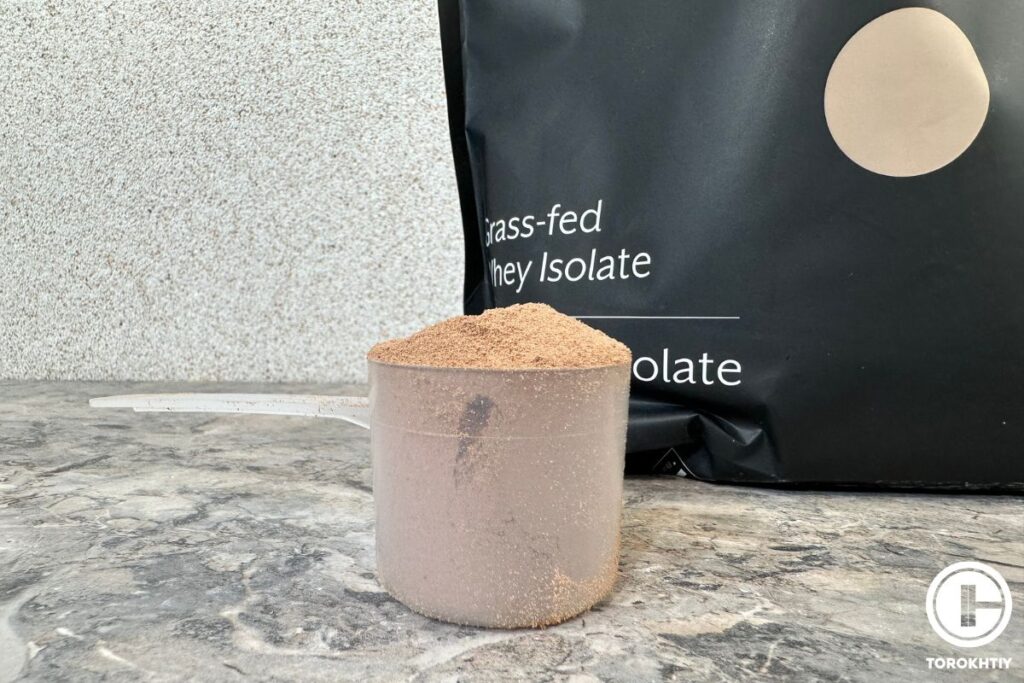
3 Other Potentially Negative Effects of Protein Shakes
In addition to digestive problems, protein supplements can have other disadvantages that you should be aware of.
❌ May Contain Contaminants or Prohibited Substances
The U.S. Food and Drug Administration (FDA) regulates the supplement market, but does not test them before they are on the market.
Therefore, the safety of protein supplements and the absence of prohibited substances or high levels of heavy metals depends on the manufacturer. In order to minimize potential risks:
- Buy proteins only from well-known brands,
- Look for third-party certified protein,
- Limit yourself to a maximum of two servings of protein per day.
❌ Can Be Source of Added Sugars
Protein shakes may be a healthier alternative to sweets and desserts. However, some products also contain significant amounts of added sugar. In order to reduce their total consumption in your overall diet, prefer protein supplements that do not contain added sugars.
❌ May Reduce Overall Diet Quality if Consumed in Large Quantities
Some athletes overindulge protein supplements and use them to replace much of the protein they could get from whole foods.
In this case, the diet becomes less diverse, and the risks of developing a deficiency of some vitamins and minerals, which are contained in high-protein whole foods, also increase.
FAQ
Should I Drink a Protein Shake if I Have Diarrhea?
If you have changed the type of protein supplement (for example, isolate instead of concentrate), protein source (pea + rice blend instead of whey), and followed all the other recommendations in this guide, but still have diarrhea after protein shake, you may have to give up altogether from protein shakes.
Don’t bombard your gut with shakes if they aren’t digested anyway.
Is It Normal to Poop a Lot After a Protein Shake?
If protein shakes dramatically change the frequency of your normal bowel movements and this is accompanied by unpleasant symptoms (bloating, abdominal pain), it is better to consult a doctor so that he can give specific recommendations depending on your situation.
Сan Protein Bars Cause Diarrhea?
Yes, because protein bars very often contain sugar alcohols. Avoid bars with sorbitol and mannitol, which have the greatest laxative effect.
Conclusion
Protein shakes can cause diarrhea for a variety of reasons. However, by applying the recommendations from this guide, you can improve the situation. If, despite the changes, the problem still remains, most likely protein shakes are simply not for you.
Do you still have any questions? Which tip are you going to try first? Leave your comments below!
Also read:
- Adding Oats to Protein Shake
- Protein Powder and Coffee
- How To Make A Protein Shake Thicker
- How Many Calories In A Protein Shake
- How Many Scoops Of Protein Powder A Day
- Does Protein Help Grow Your Glutes
- Best Milk for Protein Shakes
References:
- Milk & Dairy / ACAAI: https://acaai.org/allergies/allergic-conditions/food/milk-dairy.
- Symptoms & Causes of Lactose Intoleranc / NIDDK: https://www.niddk.nih.gov/health-information/digestive-diseases/lactose-intolerance/symptoms-causes.
- Milk allergy / MayoClinic: https://www.mayoclinic.org/diseases-conditions/milk-allergy/symptoms-causes/syc-20375101.
- Nutrition and healthy eating / MayoClinic: https://www.mayoclinic.org/healthy-lifestyle/nutrition-and-healthy-eating/in-depth/artificial-sweeteners/art-20046936.
- Food additives / BetterHealth channel: https://www.betterhealth.vic.gov.au/health/conditionsandtreatments/food-additives.
- Exercise-induced gastrointestinal syndrome / Wiley Online Library: https://onlinelibrary.wiley.com/doi/full/10.1111/apt.14157.
- Food-dependent, exercise-induced gastrointestinal distress / BMC: https://jissn.biomedcentral.com/articles/10.1186/1550-2783-8-12.
- Fructose malabsorption / National Library of Medicine: https://www.ncbi.nlm.nih.gov/pmc/articles/PMC4755956/.
- Photos are made by Torokhtiy Media team.
Why Trust Us?
With over 20 years in Olympic weightlifting, strength training, nutrition coaching, and general fitness our team does its best to provide the audience with ultimate support and meet the needs and requirements of advanced athletes and professional lifters, as well as people who strive to open new opportunities and develop their physical capabilities with us.
By trusting the recommendations of our certified experts in coaching, nutrition, and sports training programming, as well as scientific consultants, and physiotherapists, we provide you with thorough, well-considered, and scientifically proven content. All the information given in the articles concerning workout programming, separate exercises, and athletic performance, in general, is based on verified data.
The product testing process is described in more detail here.
Author: Oleksandr Maksymenko
Certified Sports Nutritionist,
MSc Sports Dietetics
Specializing in: Weight management, Fitness / Sports nutrition
Oleksandr is a professional fitness nutritionist certified by the Fitness Professional Association (FPA). He follows the principles of evidence-based dietetics and fosters a healthy relationship with food in his clients, ensuring there are no strict prohibitions on their favorite foods or frequent lapses. His primary goal is not only to achieve results for you but also to sustain them over the long term, all while enjoying tasty and delicious food.



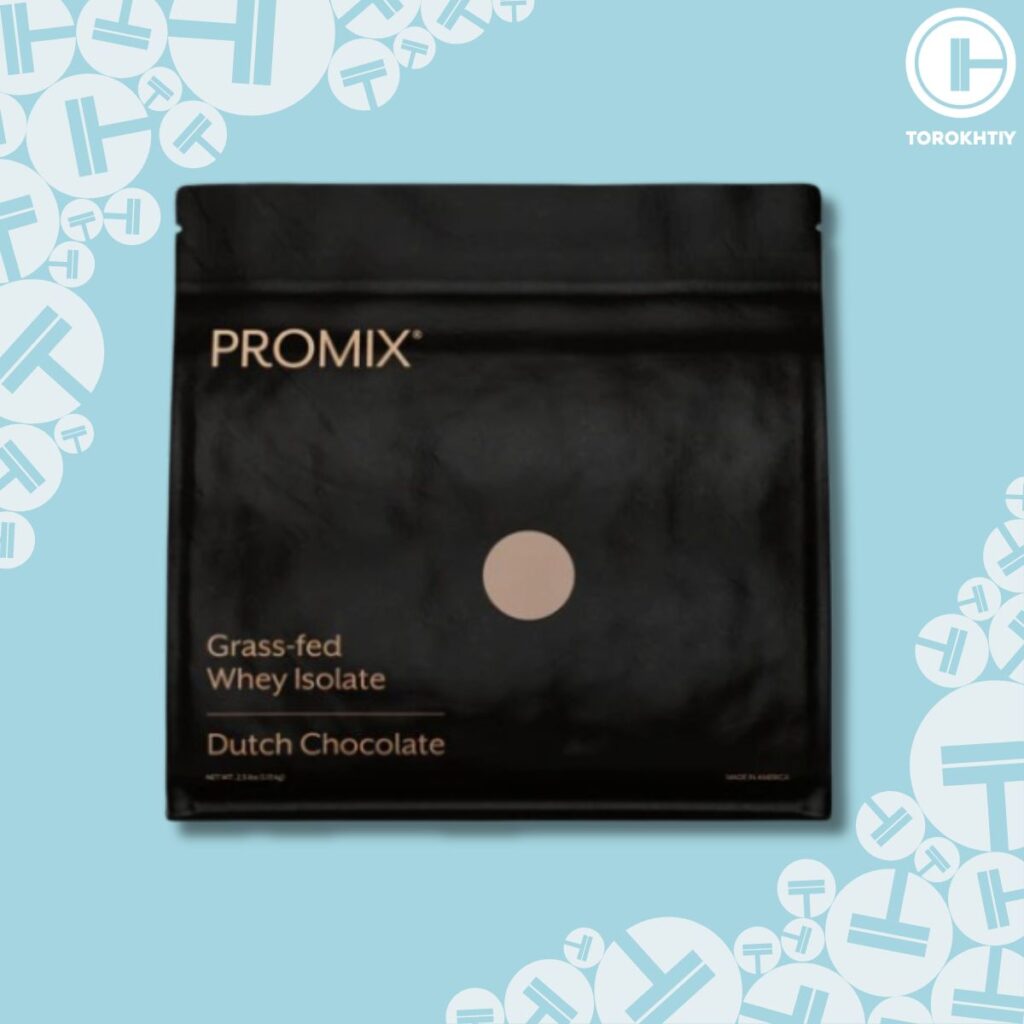
Still have questions after reading our article? Unlock your full potential by engaging with our experts and community! Don’t hesitate — leave a comment below and Oleksandr Maksymenko will provide a personalized answer and insights to help you reach your goals.